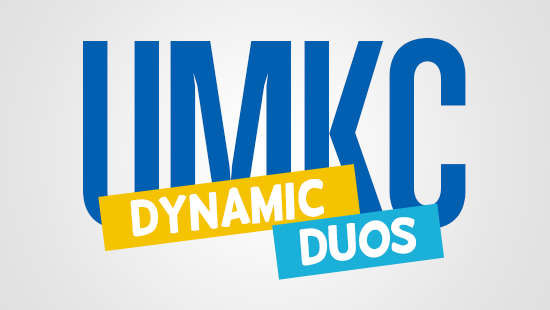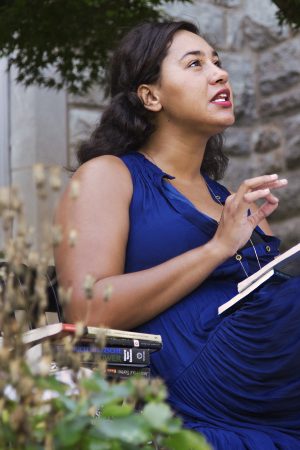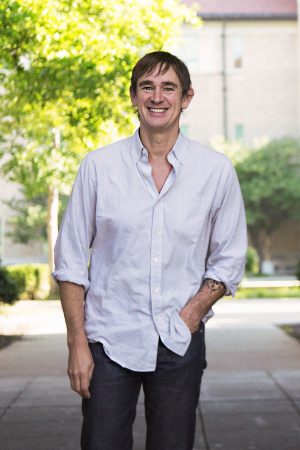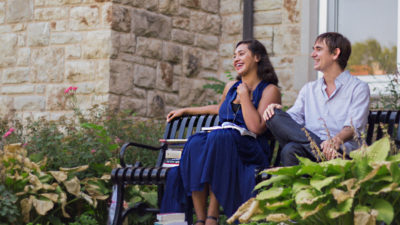The Comic Philosopher and the ‘En-Clance-opedia’

Many successful people give generous credit for their achievements to the guidance of mentors who counseled them as young adults. At the University of Missouri–Kansas City, mentorship is a vital part of the educational experience. One of the common threads in the ongoing Our Students. Our Story. #UMKCGoingPlaces series on the UMKC site and tumblr is how students appreciate the work of their mentors.
To focus even more on those crucial mentorship relationships, we’ve created another regular feature: Dynamic Duos. In interviews and images, we’re giving you an intimate look at faculty/staff-and-student mentorship pairs at UMKC. Read the other Dynamic Duos articles.
MEET CLANCY MARTIN and SYDNEY HARVEY
Clancy Martin is a professor of philosophy in the College of Arts and Sciences and a professor of business ethics at the Henry W. Bloch School of Management. A 2011-2012 Guggenheim Fellow, he is an author whose work has appeared in Harper’s Magazine, The New York Times and The Wall Street Journal, and his first novel “How To Sell” was named a Best Book of the Year in 2009 by numerous publications including the Times Literary Supplement. He writes and speaks openly about his own personal and professional challenges including failed relationships and alcoholism. He is a frequent guest as one of the Ethics Professors on KCUR’s Up to Date. Martin has been on faculty at UMKC for 13 years and has mentored students for 16 years.
One of those students is Sydney Harvey, who recently graduated from UMKC with undergraduate degrees in Philosophy and Communications Studies with an emphasis in classic and ancient studies. Martin served as Harvey’s mentor on the SEARCH (Students Engaged in Artistic and Academic Research) grant she received. Harvey won the Nanette Biersmith Award for Outstanding Service from the Department of Philosophy, not awarded each year but given to outstanding students. Currently, Harvey is a Master of Arts student in the UMKC Department of Theater, with a concentration in playwriting. She performs standup comedy.
Harvey plans to go on to pursue a doctoral degree in philosophy to become a professor because Martin inspired her and continues to mentor her. The two often meet in Martin’s office at Cockefair or in the UMKC Quad, specifically on the memorial bench dedicated to Carol Koehler, who taught at UMKC for 25 years, and served as chair of the Department for Communications. Before her death in 2011, Koehler was a mentor to Martin, showing kindness and giving time to junior faculty and students. Martin says he strives to follow her example.
Sydney, you graduated from Shawnee Mission West High School. What led you to UMKC?
Harvey: Really, I knew immediately that I would not enjoy moving to a smaller town like Lawrence or Manhattan, Kansas. So my initial reason to go to UMKC was because I could stay in Kansas City. Also, my father received his undergrad from UMKC. I additionally really like the small class sizes.

Why philosophy?
Harvey: When I first started UMKC, I transferred from Johnson County Community College with barely a 2.3 GPA — lucky for me only the classes transfer, not the grade point average. I also thought I was going to be a writer. I wanted to write short fiction, but I majored in philosophy because I fell in love with it while getting my associate’s degree. At UMKC, I had one meeting with an amazing adviser and she suggested that I add another major; I had always been interested in film so I joined the film department. Then the next semester, I took Existentialism with Clancy and bam! I’m a philosopher. Now everything I do is to create better philosophy, and to get into a great PHD program. I graduated as a Magna Cum Laude Honors Scholar.
What changes have you seen in Sydney?
Martin: With Sydney, her intellectual development has just been astonishing to watch. Her brain and her writing are simply on fire. It’s been enormously rewarding. I think she will accomplish great things as a creative mind.
Sydney, how has Clancy challenged you?
Harvey: Clancy is always a challenge. He holds me to a higher standard than any of my other professors. He believes in my ability to be a philosopher so much that he constantly gives me new outlets to create my work. He’s not afraid to tell me that something I have written is silly or not going to work or maybe it’s just plain wrong. He wants to see me succeed so we work on everything together: my writing, my personal statements, speeches, films, plays — I don’t even feel comfortable choosing lunch without his input.
Clancy, what makes faculty mentorship critical to the success of students?
Martin: Well, mentorship is critical for success in any endeavor, I think. For students, mentorship is often helping the student to see where she or he really excels, and then showing her or him how to cultivate that excellence. It’s a kind of team you create to guide a person towards success, through working with that student’s talent and also helping that student to meet other people and find other people and opportunities who can help the student develop her or his interests and excellence.

How has Clancy inspired you?
Harvey: Clancy knows everything! Well, he doesn’t know anything about life, love or happiness, but he knows everything about philosophy. Every time I have a new theory or idea I want to explore, he can give me multiple references of philosophers to read. He knows every reference I could ever need, I call him the “En-Clance-opedia” — not to his face. Sometimes I get frustrated because he knows so much, but I remind myself that by the time I am his age, I will probably know at least half of his knowledge. But I will definitely be much more interesting than him. Just in case you haven’t guessed yet, I am a comedian and I take everything with a gallon of sarcasm.
Some people go their whole lives without having a mentor. What advice would you give people about finding one?
Martin: Look for someone whose interests have some alignment with yours, who has expressed an interest in your work and who will make time for you. Good mentors are often very busy people, so you may have to pursue the person vigorously.
Harvey: Just find someone in your field who is good at what they do, enjoys what they do and has a passion to share their knowledge. Then once you find them, work as hard as you can to develop a relationship, make up excuses to go to their office hours, find research they can help you develop, constantly ask their advice about your work.
What are some things you admire about Clancy as a mentor?
Harvey: Not only is Clancy a human encyclopedia, he is an amazing writer. He has such a personal and intimate approach to storytelling that it inspires me to create work that is 100 percent authentic. You will never read work by Clancy Martin and forget for one second who is writing it. He is also great with people. He probably would disagree, but Clancy makes every student in his classes feel heard and understood. Even when he really shouldn’t, he always seems to find something brilliant to extract from even the most dull or unprepared comments from his students. I hope when I am a professor, I can emulate his talent of making every student he encounters feel important.
What qualities make a good mentor?
Martin: I think caring about the student is most important. Being honest with the student. Doing your homework on how best to help the student. Showing the student that, with patience and effort, her or his dreams are almost always within reach.
How has mentorship helped you grow as a person?
Harvey: Clancy is always there for me. I email him constantly with ideas, questions or concerns, and he emails me back if not immediately than by the end of the day. I am very lucky that I have found someone in my field of study who I respect and who I want to create my best work for. Clancy is truly a great mentor. I know I will be a great philosopher because of Clancy Martin.
What’s your favorite part about being a mentor?
Martin: Seeing my students do things that make them proud of themselves, and watching them grow and accomplish things they really wanted to do.
Being a mentor is probably the most rewarding thing you can do in your professional life. You think you’re helping someone else, and in fact it gives you much more happiness than you could give your mentee. This is often repeated, but it’s nonetheless true. Watching someone grow and flourish, and helping with that process, makes you feel genuinely good about life. It makes you feel good about human nature and the whole darn process. It also makes you very grateful to be a professor.

